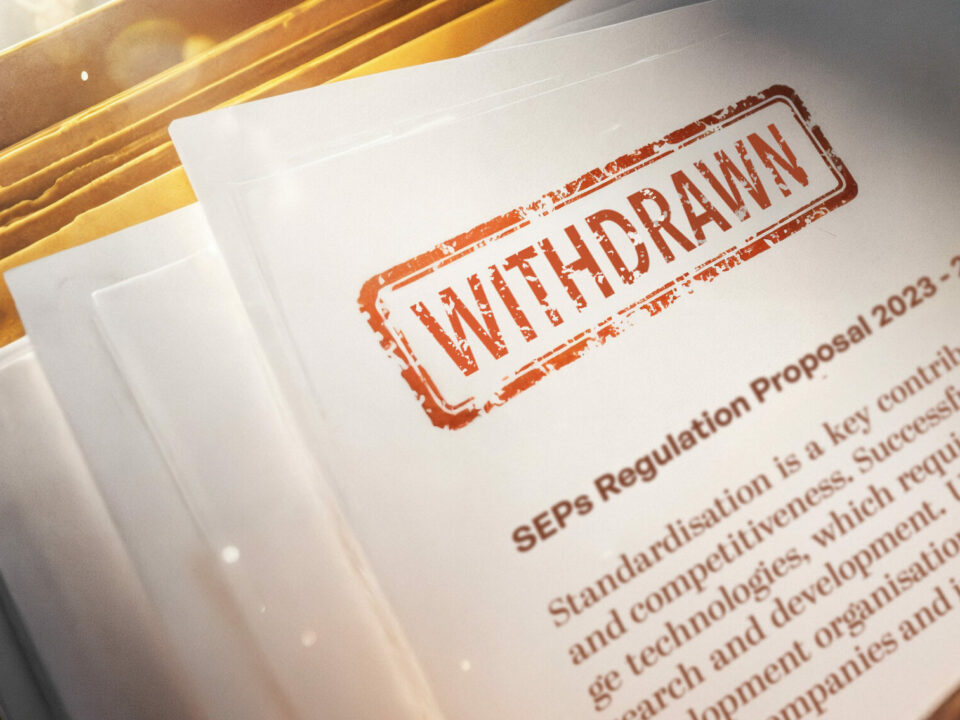Open letter to MEPs: The Commission’s SEPs proposal is an economic and legal danger zone
Dear Honourable Member of the European Parliament,
We, IP Europe, are writing to you again in the context of the European Parliament’s review of the European Commission’s controversial proposal to regulate the licensing of standard-essential patents (SEPs). This week we try to explain in greater detail why the proposal is an economic and legal minefield that would harm innovation in Europe.
Why an open innovation ecosystem?
IP Europe is a coalition of research- and development-intensive organisations. We champion the open innovation ecosystem. It enables patents and open standards to drive private investment in R&D-intensive technology and deliver progress for EU citizens and businesses.
Our members include both licensors and implementers of patents, including SEPs.
These member companies collaborate within standards organisations to develop open standards that create global product markets. By reinvesting generated licensing revenue in R&D, our members drive rapid innovation. One example: the 4G and 5G standards (among others) that enable electric bikes, e-scooters, connected automobiles and mobile health tools. Another example: audio and video technology used in more than 10 billion broadcast and streaming devices worldwide.
European technology sovereignty depends upon the open innovation ecosystem, which is consistent with European strengths and values. This proposed SEP regulation threatens that system. Impairing European participation in open standards development will only benefit Big Tech—mostly non-European!—and very large implementers.
A deeply flawed SEPs proposal
IP Europe supports the European Commission industrial strategy and its stated aims of making the licensing of SEPs more transparent, efficient, and predictable. From a practical perspective it would not only not achieve the Commission’s shared objectives of transparency, efficiency and predictability, but instead would cause lasting and potentially irreversible damage.
The proposal’s basic flaws include the lack of legal basis, inconsistency with the Charter of Fundamental Rights, incompatibility with the WTO TRIPS Agreement, and an undefined scope.
Thus, the initiative as written would be certain to harm the open innovation ecosystem and standards development and impair the EU’s technology sovereignty. It could significantly undermine incentives to invest in future critical technologies and fuel further brain drain in favour of jurisdictions that reward open innovation.
An own goal in the making
Moreover, the proposed SEP regulation would disadvantage firms holding European patents. It would undermine European national courts and the nascent Unified Patent Court. The rules would deprive the Parliament of any ongoing oversight powers. They would undermine ETSI and European companies that contribute significant resources to European standards development. The proposed regulation would not help SMEs. Finally, the consequences of the expected detrimental impact on innovators’ return on their R&D investment through licensing revenue should not be underestimated.
Unfortunately, the substantive measures set out in the SEPs proposal were not subject to meaningful consultation prior to publication. There was no thorough discussion with industry of the complex measures proposed. Furthermore, as we and others have noted, there is no empirical evidence to justify the regulation of SEPs: The study on which the Commission says it based its proposals found no objective evidence to justify the SEPs proposal. In fact, it did not even suggest that regulation was needed or appropriate more generally.
Disproportionate, meet unrealistic
The SEPs proposal not only disregards market realities and the Commission’s own studies and advice of its own experts. It is also disproportionate. None of the Commission’s objectives justify a radical regulatory intervention on this scale.
Lastly, at a purely practical level, it is highly improbable that the European Union Intellectual Property Office (EUIPO) could in two years establish itself as a fully operational competence centre. It has a modest budget and no technical competence or experience in essentiality checking or determination of aggregate royalties and Fair, Reasonable and Non-Discriminatory (FRAND) terms and conditions.
Consequently, IP Europe has urged the European Commission to withdraw its SEPs proposal to perform a more detailed analysis of the impact of the initiative.
Given such concerns, and others which we have omitted here, we urge all MEPs to hear us out, ask tough questions, and insist on a thorough, independent legal analysis.
For quick, factual analysis of the Commission’s SEPs proposal we encourage you to visit our blog. We have already published a position paper and detailed analysis. In addition, we regularly report on independent, third-party comments. You can see it at ipeurope.org/news/ or by scanning the QR code below.
We would also be grateful for an opportunity to answer your questions in person. We stand ready to share what we know and answer any questions you might have.
Sincerely,
Patrick McCutcheon
Managing Director, IP Europe




